Hezbollah Condemns 'Insulting' Khamenei Cartoons By Charlie Hebdo
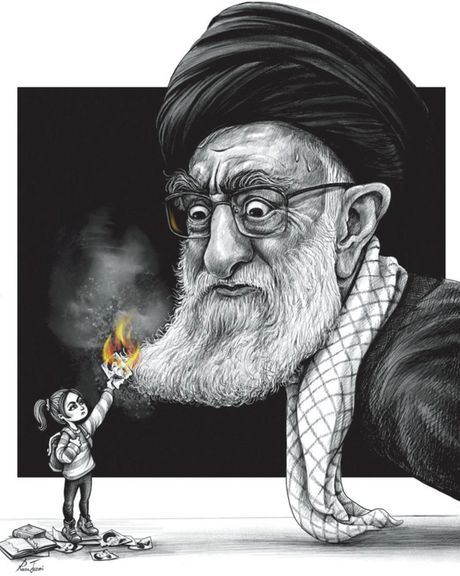
The Lebanese Hezbollah has condemned the publication of caricatures by the French satirical magazine Charlie Hebdo depicting Iran’s Supreme Leader Ali Khamenei.

The Lebanese Hezbollah has condemned the publication of caricatures by the French satirical magazine Charlie Hebdo depicting Iran’s Supreme Leader Ali Khamenei.
This is Hezbollah’s first reaction related to popular anti-regime protests in Iran in four months, calling the caricatures as an “ominous” development, Iran International’s correspondent reported from Beirut.
Some Lebanese in social media have reacted to Hezbollah’s statement, asking why the pro-Islamic Republic militant group never condemned the killing of young Iranians during the protests, but condemns a French magazine exercising its media freedom.
Charlie Hebdo published its caricatures showing Khamenei as a despot and made fun of Iran’s ruling clerics. The Islamic Republic quickly condemned the publication and even lodged protests with the French government. The commander of the Revolutionary Guard, Hossein Salami, also threatened Charlie Hebdo that has already been the target of deadly attacks by Muslim extremists in the past.
The leader of the group, Hassan Nasrallah, who is very vocal in condemning Western countries, Israel or some Arab states on various occasions, has so far remained silent over the protests in Iran.
Hezbollah’s statement accused Charlie Hebdo of attempting “to weaken the highest religious and Islamic authority in the world.” Khamenei’s propaganda machine portrays him as “the leader of Muslims”, when in fact he represents a part of the Shiite sect, which is a small minority compared with the dominant Sunni majority.
Hezbollah also urged France “to punish” the perpetrators of “the shameless insult to sanctities.”
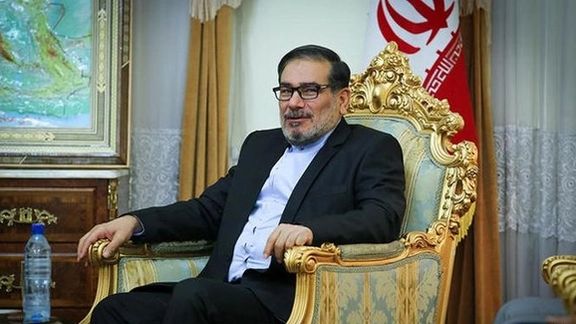
Nour News has dismissed rumors that Iran’s national security chief Ali Shamkhani will be replaced after one of his former aides received the death penalty for spying.
The website close to the Supreme National Security Council in a note published Friday accused “radical circles” of spreading the rumor after Alireza Akbari a former top official close to Shamkhani was sentenced to death earlier this week as a “British spy”.
Without mentioning Shamkhani by name, Nour news said radical elements who endanger national security by making outrageous claims decided to take advantage of Akbari’s case to spread harmful rumors.
Akbari had been deputy defense minister under the reformist President Mohammad Khatami, from 1997 to 2005 and an advocate of the 2015 nuclear accord with the West.
UK foreign secretary James Cleverly Thursday called on Tehran not to execute Akbari who is dual British-Iranian citizen.
A source close to the Islamic Revolutionary Guard Corps has provided documents to Iran International showing that the death sentence for Alireza Akbari was a move to weaken Shamkhani’s position in the clerical regime.
It seems that President Ebrahim Raisi, Intelligence Minister Esmail Khatib and Interior Minister Ahmed Vahidi are exerting pressure to remove Ali Shamkhani from the post.
In a statement published by Iran's Intelligence Ministry, Akbari was described as "one of the most important infiltrators in the country's sensitive and strategic centers". He was arrested in 2019.
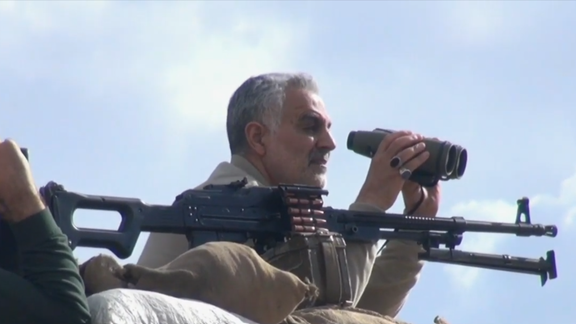
Reports say schoolchildren in some mosques in the UK were taught special lessons in praise of Iranian IRGC Quds Force commander Qassem Soleimani.
At least six mosques across the country organised events to honour the former Commander of IRGC Quds Force as a “martyr” after he was killed.
On January 3, 2020, the US military, on the order of President Donald Trump, killed Soleimani in a drone strike near Baghdad International Airport, saying that he had been "actively developing plans to attack American diplomats and service members in Iraq and throughout the region."
Photographs posted on social media show children sitting in an unnamed mosque while being taught about Soleimani.
Reports say at the Idara-e-Jaaferiya mosque in Tooting, South London, and in Hammersmith, West London, Iranian officials made speeches praising the IRGC commander days after his death.
In Manchester, the Islamic Institute said it was holding a “commemoration of the martyrs” killed by “the aggressor and criminal US regime”.
In Birmingham, the Imam Reza Centre said it was honouring “our beloved martyrs” Soleimani and Abu Mahdi al-Mohandis, an Iraqi militia commander who died alongside him.
The revelation comes as UK lawmakers voted Thursday to ask the government to designate the IRGC as a terrorist organisation.
Soleimani, who was Iran’s top military and intelligence operator outside its borders, was in charge of supporting and organizing militant proxy forces, including the Lebanese Hezbollah and Iraqi Shiite militia groups that have repeatedly attacked US forces.
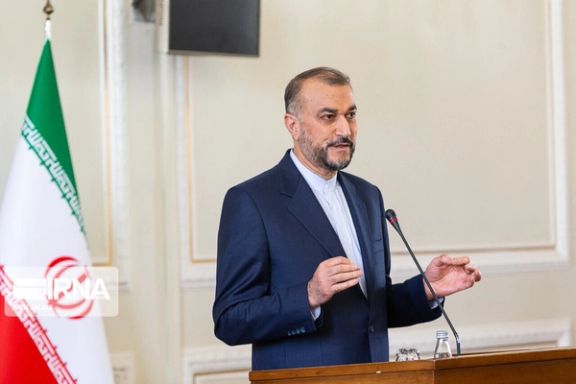
Iran's Foreign Minister Hossein Amir-Abdollahian will visit Moscow next week to meet his Russian counterpart Sergei Lavrov, the Russian Foreign Ministry said on Thursday.
The visit was announced shortly after a phone call between the two countries' presidents.
Russian Foreign Ministry Spokeswoman Maria Zakharova said at a briefing that the two sides will continue to exchange views on several issues, including Iran nuclear deal known as the JCPOA.
“On January 17, Russian Foreign Minister Sergey Lavrov will hold talks with his Iranian counterpart, who will be in Moscow on this day on a working visit. During the talks, the sides are expected to continue an interested exchange of views on a number of topical international and regional topics, including the situation around the JCPOA on the Iranian nuclear deal, and interaction between the two countries at international platforms, including the UN, the SCO, the situation in Syria, Afghanistan, the Caucasus Region and the Caspian issue,” TASS quoted Zakharova as saying.
“There are plans to discuss the bilateral agenda, primarily its trade and economic component in the context of the implementation of key joint projects in energy, transport and other sectors, including taking into account the transition to the final phase of the negotiation process to conclude a full-fledged agreement on a free-trade zone between the EAEU and Iran,” she underlined.
Military ties have expanded between the two countries since the start of the Ukraine war, with Tehran supplying kamikaze drones to Moscow to use in its invasion.
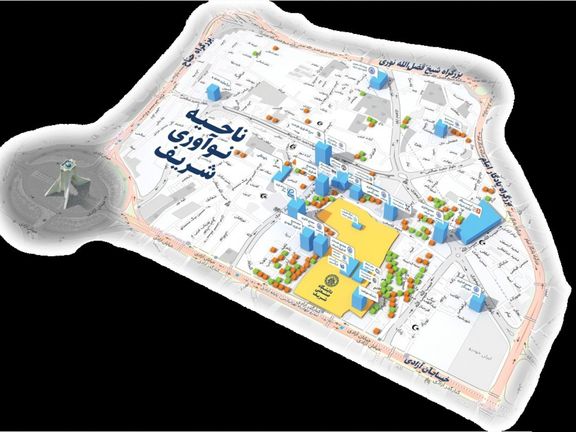
Iran's government has established an office to boost science and technology companies, while it has been disrupting access to the Internet, harming the sector.
An article published by Aftab News in Tehran on December 10 shed some light on some of the activities of the center, which received a handsome budget by Iranian standards after Supreme Leader Ali Khamenei last year called on officials to promote science-based companies.
Usually, Khamenei hears something from his advisors and issues some general and vague instructions to the country’s authorities to strengthen an industry or a certain sector of the economy. Such remarks are then interpreted as unquestionable orders and officials or factions start competing for a piece of the budget. Promoting knowledge-based firms and start-ups is among these contentious issues.
While the achievements of traditional government departments are more measurable, knowledge-based outfits have no touchstone to be measured against because such activities are new for the bureaucracy and authorities do not clearly know what to expect from them.
The actions of the Presidential Office of Science and Technology with a budget of nearly 30,000 billion rials (about $7.5 million in today’s exchange rates - much more last year) and numerous credit lines, is not out in the open and subject to scrutiny for the public, unlike for instance the ministries of energy, health or education. Therefore, few people are aware of how such an astronomical budget in rials is spent.
Since Khamenei included the adjective “knowledge-based” in the motto of the current Iranian year (which started March 21), the most important thing that occurred is that many companies redesigned or reintroduced themselves as such to take advantage of loans and incentives available from the government.
According to a UNESCO report, by 2020, 49 innovation accelerators had been established in Iran with private equity and 113 innovation centers had been set up in partnership with science parks and major universities.
According to Aftab News, Vice President for Science and Technology Rouhollah Dehghani Firouzabadi has recently toured Sharif Science and Technology Park, where it is supposed to be housing nearly 600 companies, 19 accelerators, 15 investment funds, and 10 innovation centers. But the situation is not like the start-up atmosphere at all. Instead, there are a lot of empty halls with many computers and no operators. The hub, which was boastfully presented as the beating heart of Tehran in the field of technology and innovation ecosystem, looks like an abandoned and bankrupt business center.
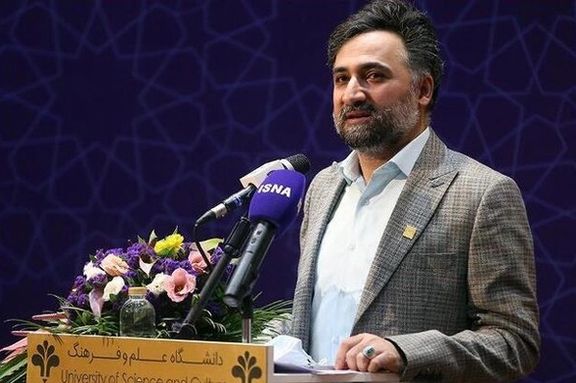
Firouzabadi, appointed in September, said the country’s problems will be resolved if decision-makers are chosen from among the scientific elite, adding that “I believe I need to delegate powers to managers because a specialized manager will be more knowledgeable about his field than I am.”
Currently, more than 7,900 knowledge-based companies are registered but, according to people in the sector, most of them are not active or are doing something different from what they were supposed to do.
The presidential outfit, which has recently rebranded itself with a longer title to include science-based economy, has even outsourced its most important job to companies from the private sector. Its most important task used to be identifying whether a company is science-based or not, and now this task is carried out by contractors.
Companies that seek to apply to be registered as knowledge-based – to be able to use its advantages -- should be evaluated in terms of product and corporate frameworks. Now, there are a large number of evaluators and brokers from the private sector. It is not clear how such contractors are selected or if they are connected to government insiders. Such a system is prone to nepotism and corruption and there is no supervision over it.
One of the noteworthy activities of the center is organizing the so-called science and technology tours to countries like Turkey and France. While many start-ups and tech companies as well as people active in such fields are emigrating in the last 18 months due to inflationary stagnation and widespread poverty in Iran, such luxurious tours aimed at “connecting the researchers of the Islamic world" seem suspicious, says Aftab News.
Another way that the center is spending its extravagant budget is holding online workshops and seminars, which are usually held with only a handful of participants because the instructors are chosen based on their close connections to the authorities and not based on their expertise.
There is also an inherent contradiction in promoting new technologies, while at the same time restricting internet access to the public to control the flow of information about the current wave of antigovernment protests.
On Monday, Mojtaba Tavangar, the chairman of the Digital Economy Committee of the parliament, wrote to Raisi asking him to restore access to the Internet and to establish a fund to compensate for the damage caused to businesses. New figures show that due to extensive internet and social network restrictions, 20 percent of people in Iran have lost their online jobs in the past four months.
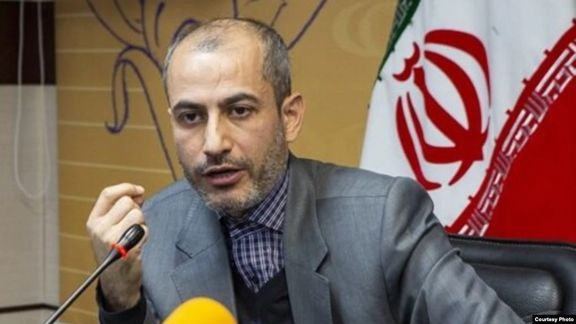

Iran’s economic situation is already alarming with its currency at historic lows and high inflation, but reports suggest next fiscal year will be even more cataclysmic.
While the US dollar was trading for over 410,000 rial threshold on Thursday, President Ebrahim Raisi’s administration has not finalized the country's budget for the next Iranian year starting March 21, and the fate of the country’s Seventh Five-year National Development Plan (2022-2026) is still in limbo.
Following weeks of buck passing between the administration and the parliament, in which lawmakers insisted that without a final new five-year plan the budget cannot be considered, the government is still dragging its feet. Some hardliner supporters of President Ebrahim Raisi argued Tuesday that both plans may be discussed simultaneously at the parliament, but Speaker Mohammad Bagher Ghalibaf opposes any change of procedures.
The law says that when a five-year plan comes to an end, the government should submit a new one, based on which the legislature can debate a new budget. But amid lack of economic and financial clarity due to sanctions and international isolation, the government has not finalized the next five-year plan, while the deadline to submit a budget passed in December 6.
Since 1989, the Islamic Republic has been devising five-year development plans. A lot of organizations and institutions are involved in designing and actualizing these plans, which mostly remain on paper, because they are full of general statements without planning for the needed monetary resources.
According to parliament rules, if the administration misses the December 6 budget deadline, it must attach an addendum to the budget bill that will earmark spending for quarterly portions of the year. This means demanding extra work from an administration that has already failed to perform its ordinary procedural duty. Quarterly allocations mean parliament will approve only three-month budgets, which will tremendously complicate operations not just for government departments, but all the businesses owned or controlled by the state, which constitute up to 80 percent of the economy.
Considering the steep fall of the rial and growing sanctions pressure, the administration cannot have a reasonable estimate of the dollar exchange rate and the amount of revenues from oil exports for the coming year to be able to finalize the details of the budget. On the other hand, the government is selling oil under the market price to small Chinese refineries and through illegal ship-to-ship transfers to circumvent sanctions. Now that Russia is also competing with Iran in sales to China, the government is not certain how much crude Tehran would be able to sell and at what price.
In July, the Supreme Accounting Office released a report covering the period March 21- May 20 showing that except tax revenues, all other major sources of income grossly underperformed, which local media said was a serious warning for the government and the economy. The government’s revenues from taxes, oil exports, customs duties, etc. totaled 880 trillion rials or about $3.5 billion (average free market exchange rate at the time) in the 60-day period. This was just 37 percent of the projected budget revenues. It is important to note that only 15 percent of the projected oil income was collected.
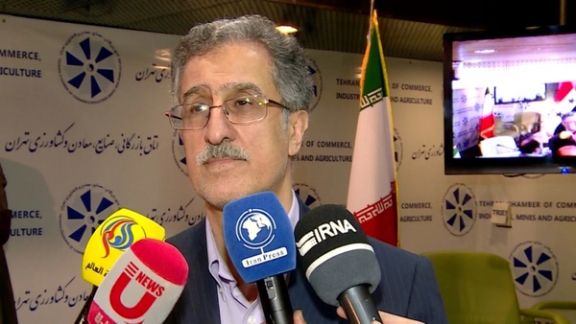
All this chaos is happening on the backdrop of over 115 days of antigovernment protests, that have accelerated capital flight. Confirming the massive outflow of capital from the country, head of Tehran Chamber of Commerce, Industries, Mines and Agriculture, Masoud Khansari, said earlier in the month that the annual outflow of capital has reached about $10 billion.
Opponents of the Islamic Republic have also urged people to withdraw their deposits from government banks to put further pressure on the government, which has been printing more money in recent years. The money supply has grown at an unprecedented pace since September.
Banks have raised interest rates to attract deposits. In the past few days the Central Bank has given the go-ahead for up to 20-percent interest rates for banks to pay. Although the Central Bank says any rate more than 20 is a violation of the law and can lead to the firing of a bank manager, a many banks – especially semi-private institutions are giving 23 to 25 percent interest under the table.
Talks to revive the JCPOA and lift most of the US sanctions have stalled since September when the last attempt by the European Union to broker a deal fell apart.